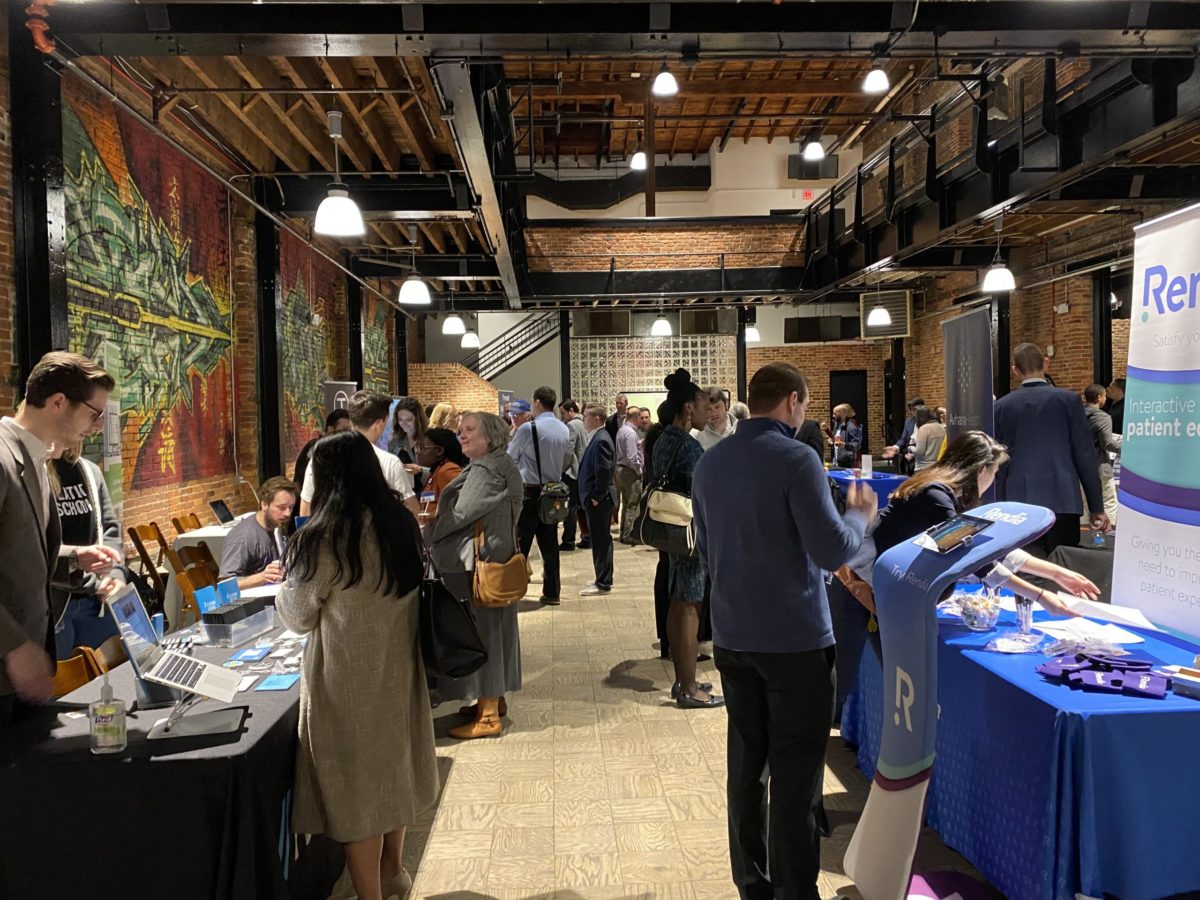Building a startup can feel like a narrow prism.
Early-stage companies are often looking to solve very specific problems and create new business models with technology that’s tailored to these aims. This process is all-encompassing, and it can feel like the outside world is tuned out.
Not in 2020.
Most business leaders started the year with one plan, and it had to change three months later when the COVID-19 pandemic arrived with a public health and economic crisis all in one. Not to mention, offices were largely closed. A couple months later, protests that followed the killings of George Floyd, Breonna Taylor and Ahmaud Arbery reawakened the Black Lives Matter movement, which demanded to be addressed at work.
All this is to say, the world has changed since we put together our 2020 RealLIST Startups, the annual list of promising early-stage companies. So this six-month check-in had to account for those wider forces. We asked founders about their product and team status, but we also asked about how the pandemic affected their business and how they’re responding to the push for racial equity. It means you’ll find pivots and personal stories below; that’s where we are. Look at is as a snapshot of the city’s up-and-coming companies in a changing world.
Here’s the list:
1. clean.io
The top company on our January list once again grabbed headlines last week, with a $5 million Series A. Just after earning the top spot on the RealLIST, the cybersecurity startup moved from Federal Hill into 4,000 square feet of office space in Natty Boh Tower, then shifted to working from home a month later — but “we haven’t really skipped a beat,” said CEO Matt Gillis.
The team has grown to a team of 35 people as it continued to hire during the pandemic. Led by veterans of Baltimore’s advertising technology community including Gillis, who is a former Millennial Media exec, the company has found traction working in digital media, as its technology prevents malicious JavaScript from being executed protect against malvertising. The technology is now running on 7 million websites, per the company.
It has continued “steady business growth” during the pandemic, Gillis said, and there has been increased opportunity for attempted exploits by the bad actors they seek to prevent. With the team growing, Gillis focused his response to our question on racial equity around hiring.
“We have committed to posting our open roles broadly to make sure we are bringing in the most qualified and diverse group of candidates that will help make our team even better,” he said.
2. Sonavi Labs
A win at Arab Health 2020 quickly followed the RealLIST honor, and the company is continuing to advance its digital stethoscope platform that combines noise cancellations and AI. With the pandemic, the team is moving as fast as it can to work on research and regulatory approvals as it sees increased adoption of telehealth widely, and its own product as a potential aid for distancing.
“Our pilots and research initiatives will be starting back up in the fall, and we have additional studies that we have been able to line up as a result of the rising telehealth trend,” CEO Ellington West said. “Our platform can support chronic patients and keep them away from hospitals unnecessarily, avoiding potential COVID-19 exposure.”
When it comes to racial equity, the diverse team that became one of the few African American woman-led companies to raise $1 million last year is also thinking about the racial disparities in the health system.
“Our company has always strived to be a beacon of diversity and racial equality. It is unfortunate that we have to address racial inequalities in healthcare and the systemic disparities that prevent so many from accessing critical and necessary care,” West said.

Sonavi Labs, led by CEO Ellington West (fourth from left) picked up the pitch win at Arab Health 2020. (Photo via Facebook)
3. Truvelop

Lisa First-Willis. (Courtesy photo)
The Locust Point-based company, which makes technology for workforce talent evaluation and development, marked one year with its product in the market during the first quarter. With the pandemic, the company looked to be adaptive and responsive to the shift to remote work and sought out input from its community.
“Based on this feedback, we released a number of product features and enhancements designed to help organizations make evaluating and developing employees more engaging, efficient and actionable regardless of where the employee is working — in office or remote,” said CEO Lisa First-Willis, who is former head of HR for Millennial Media.
Sales pipeline activity slowed down in March and April with the pandemic, but it didn’t lose a customer and has picked back up in the months since, said First-Willis.
In March, Mike Anthony joined as SVP of Sales, bringing another former Millennial Media team member into the fold. In June, the company was accepted into the Microsoft for Start-Ups program, which offers a number of benefits including Azure hosting credits, and also aid through the federal government’s Paycheck Protection Program.
As the Black Lives Matter movement reawakened nationwide, conversations started individually and as a team about how the HR tech platform could support racial equity.
“In direct response to Technical.ly’s call to action for Baltimore businesses to speak up against systemic racism in our country, we have been working on adding a number of resources to our Knowledge Center to help managers promote open dialogue with their team members around diversity, inclusion and addressing systemic racism in the workplace and beyond,” First-Willis said.
4. Ortus Academy
The company focused around financial intelligence and education added partnerships with Sylvan Learning Centers and the Stacking Benjamins podcast. It also launched adult-level courses focused around financial stability and credit confidence, CEO Aaron Velky said.
With the pandemic bringing a call to support people and provide financial transparency, it also has two new verticals. Serving businesses, the company added a financial wellness toolkit as part of its Money Club products that provides quarterly workshops, online content and access to a community. For youth organizations and education companies like tutoring services, it also launched a virtual classroom option that trains folks to deliver virtual summer camps through a model that bridges financial literacy with social and emotional learning.
In the wake of the calls for justice, Velky said the team has furthered already-prevalent conversations about addressing systemic racism. It focused in on making its content inclusive and supporting financial growth, as well as on the team when it comes to representation and creating opportunities.
“It has challenged us to think about how we create content, who we can include in the production of it, how we can loop in small and large solutions to any obstruction practices, and create better awareness of predatory services that may financially condemn certain population subsets,” he said.
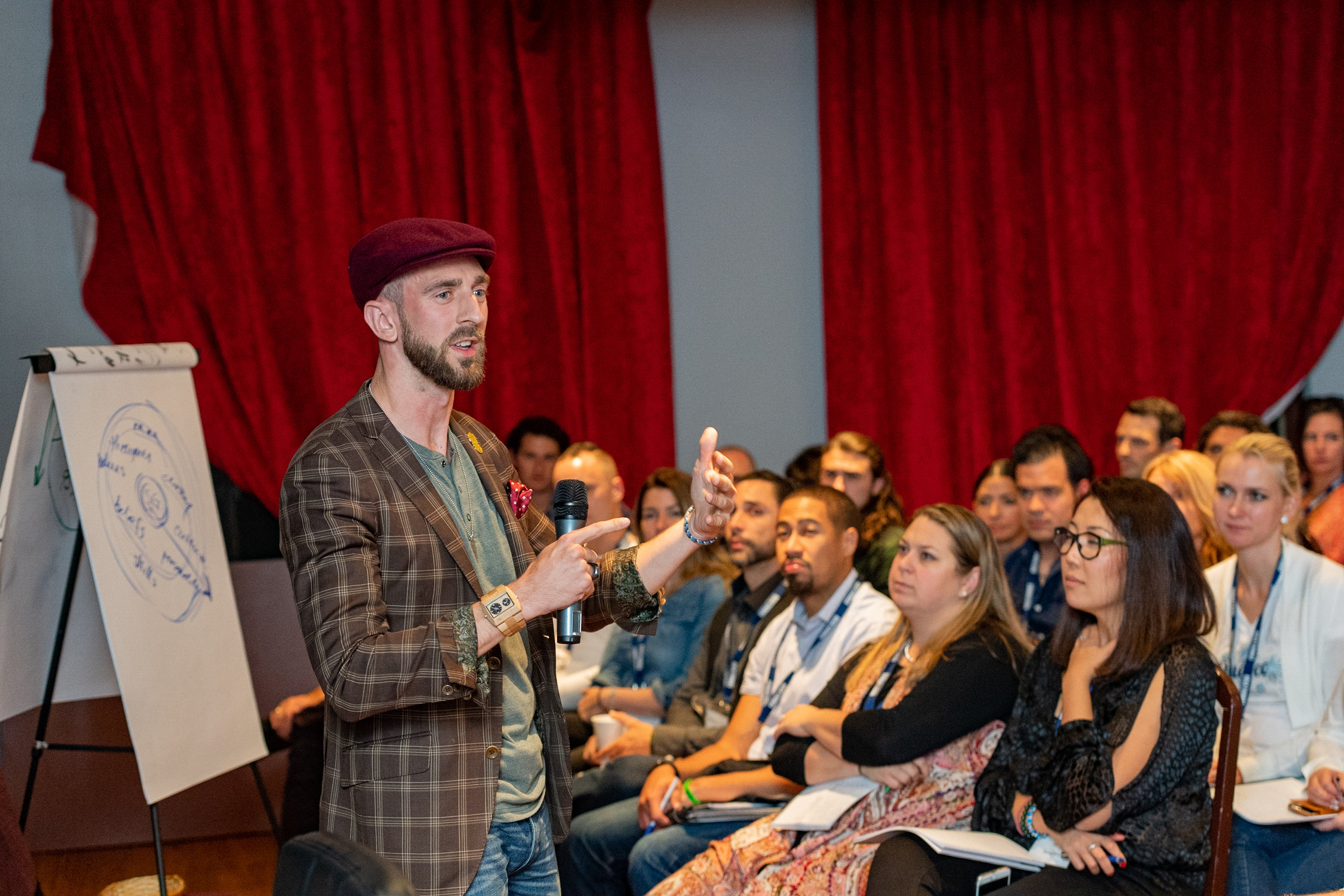
Aaron Velky is CEO of Ortus Academy. (Courtesy photo)
5. SpotWash
The app-based car wash company had touchless service built into its model already. With the pandemic, it pushed ahead earlier than expected with its launch of SpotWash Anywhere, bringing its service out of parking garages where folks live and work to driveways, lots or parking spots in any ZIP code. With people driving less in the early weeks of the pandemic, this increased the Total Addressable Market for the company, said cofounder Freddie Ephraim. And now the number of drivers is rebounding.
Along with building a racially diverse team, Ephraim said the company has a merit-based system to help employees grow in their roles with the company based on specific numbers, so that racial bias and nepotism are not involved.
“Our employees know exactly what they need to do to get to the next level, what they will make when they get there, and how to stay there by very clear expectations and goals,” Ephraim said.
6. SafetyPIN Technologies
The company that offers a digital trust badge for the sharing and gig economies began the year coming out of the latest Conscious Venture Lab accelerator cohort. The pandemic-prompted shutdowns stalled growth for a company that was finding a focus on in-home, on-demand child care. But a PPP loan has helped.
“We are weathering out the storm,” said CEO Jenny Thompson. Going forward, Thompson is watching trends that portend more in-home child care and aging parents staying home longer.
Social and criminal justice have always been at the core of the company, and was part of product design from the start, Thompson said.
“People mistakenly think our product and company are inherently biased because we run background checks. In fact, we take into account the flaws in the system, allow applicants to offer background/mitigating circumstances, and incorporate our proprietary behavioral review to give us a broader picture,” Thompson said. “Our company exists to establish trust, not punish people for history.”
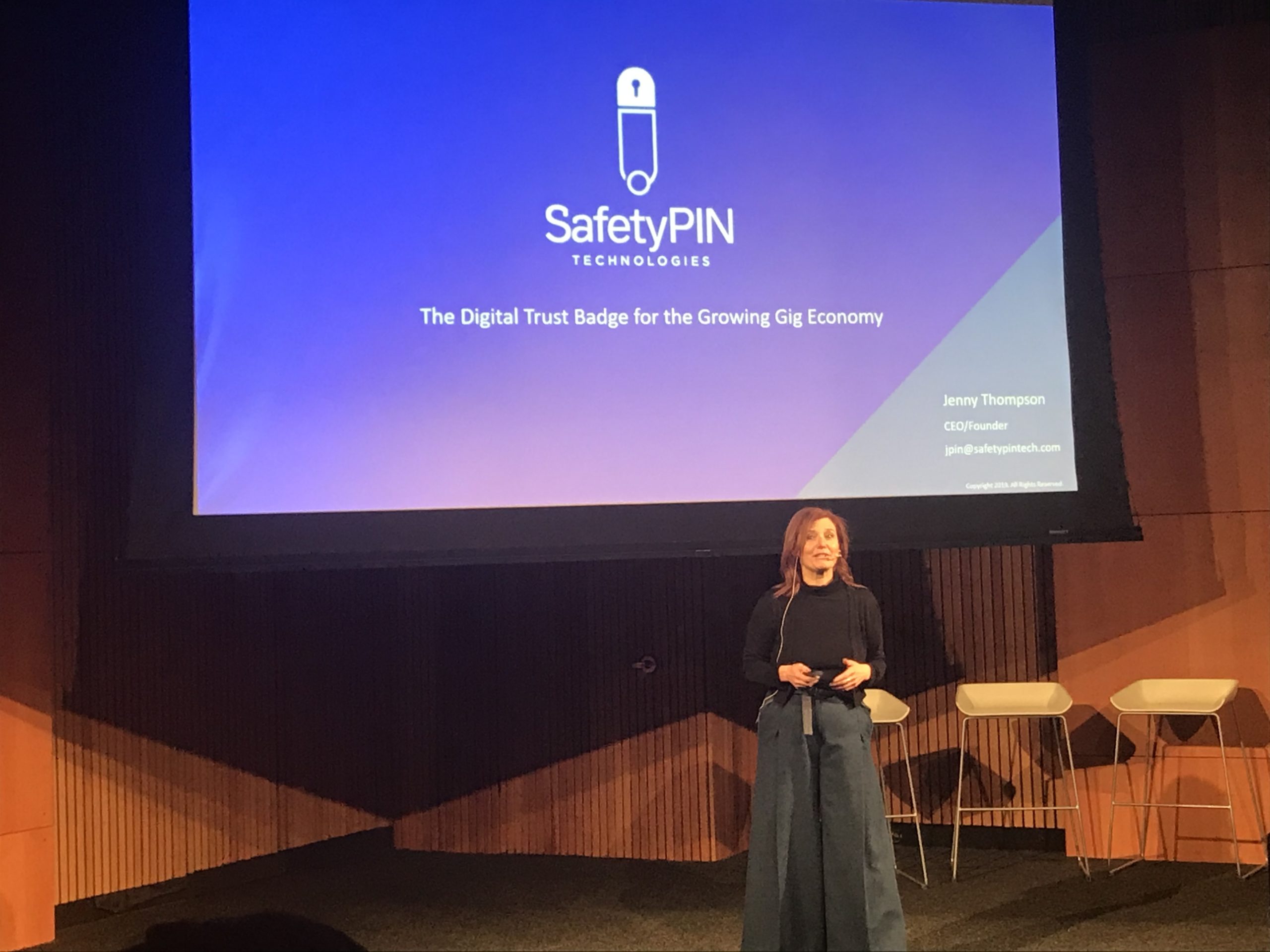
Jenny Thompson pitches SafetyPIN at Conscious Venture Lab. (Courtesy photo)
7. Napp
The on-demand child care network made some tech upgrades by launching an Android app and a new website. The slowdown in sitters that came with the pandemic’s distancing requirements affected the business, said cofounders Katie Carroll and Claire Cianos. However, it wasn’t a complete halt, as the network includes frontline workers who still needed childcare and leaned on the service.
“We support so many nurses and doctors and people that didn’t get to stay at home,” said Carroll.
By the summer, it had a new offering called Napp Camp, which allows families to book a consistent sitter for a set period of time, like a week or a month. With schools shifting to virtual, as well, the cofounders are planning to extend the model for the school year. They’re also looking to offer virtual activities that families can book in addition to getting a regular sitter.
The company is also launching an initiative called Book for Books that is aimed at being a step to foster diverse and equitable communities. Partnering with D.C.-based social enterprise First Book, it is adding a feature to the app that allows anyone who books a sitter to be able to contribute to the donation of a book to children who are under-resourced. Additionally, Napp is purchasing books that can be made available to sitters, with a different cultural focus each month. The idea is to provide “windows into diversity” that influence from an early age.
8. Renalert
The startup that’s working to prevent acute kidney injury has been working with Microsoft engineers to integrate its hardware and software product through the Microsoft Innovation Acceleration Award. With the pandemic, the company was affected by the shutdown of hospital operations including clinical work and some product demos, said CEO Aaron Chang, who also transitioned to working from home.
When the pandemic arrived, Chang said the Warnock Foundation provided funding so he and others in the Hopkins community could divert time to making protective masks. It had a specific focus on serving organizations that work in communities facing the brunt of the COVID-19 disparities in Baltimore.
Chang said he attended two marches following George Floyd’s death. He also said he remembers attending a march in D.C. following Philando Castile’s death, and thought of how little has changed.
“I think with all of this it’s easy to get numb, but George Floyd’s story, with him being a former high school athlete in Texas, really got to me. I also grew up in Texas and ran track, where many of my teammates were African American. I couldn’t imagine that happening to one of my friends,” Chang said.
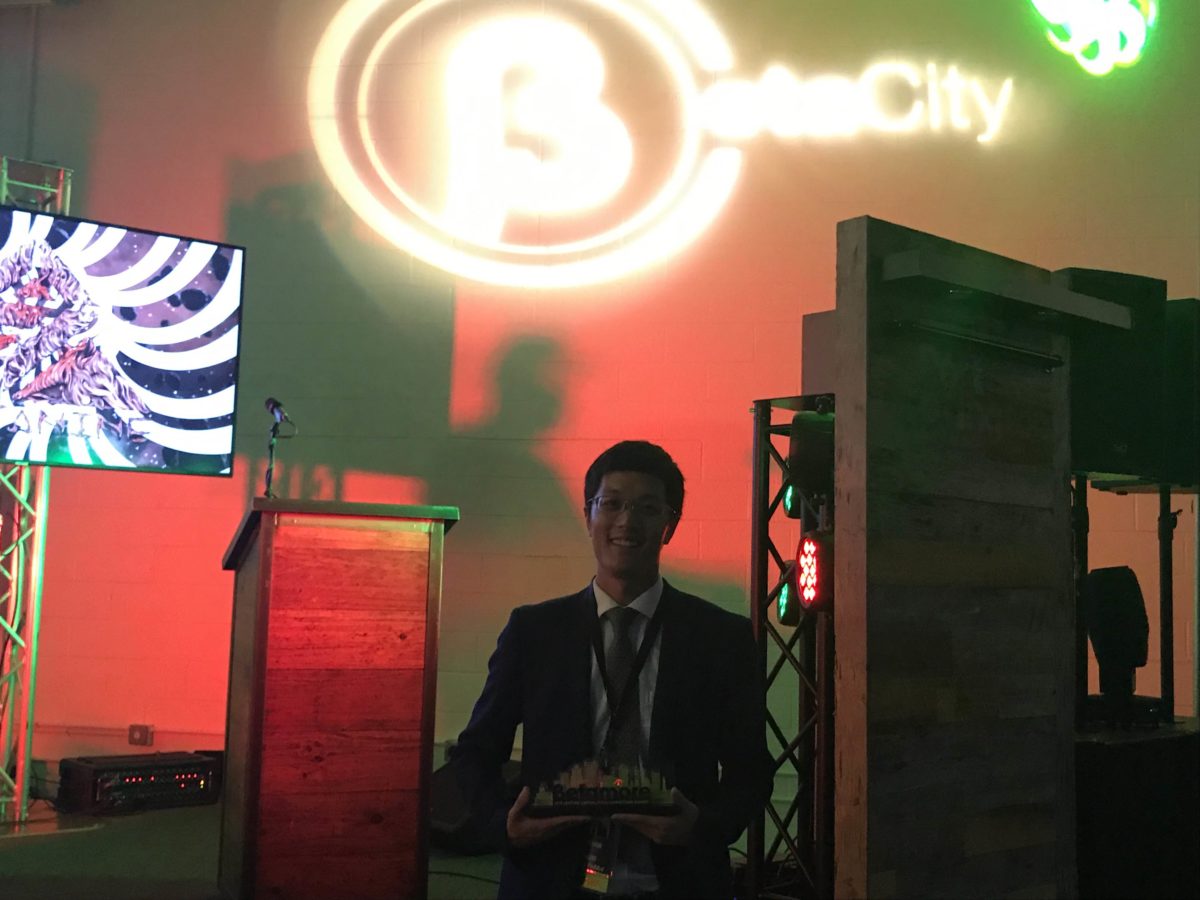
Renalert CEO Aaron Chang. (Photo by Stephen Babcock)
9. Nest Collaborative
The company offering lactation support via video saw demand in telehealth rise during the pandemic, and has seen rapid growth as a result, said CEO Amanda Gorman: From January to June, the company increased revenue by 750%. It also brought on five new team members between March and June.
Nest also has partnerships with organizations including an international service provider for breastfeeding parents and an independent physician association, and it is taking part in a university doctoral study analyzing the effects of lactation telehealth component on outpatient pediatric practices.
“Needless to say, the COVID-19 pandemic has helped confirm our business and care model by educating the market on the value and viability of telehealth,” Gorman said. “We’re grateful to have been positioned well and able to serve communities in need during this scary time, bringing a sense of reassurance to so many new mothers experiencing heightened anxiety during what is often already an anxious period for them.”
With the call for racial justice, it led to conversations about how addressing systemic racism can be part of the team’s daily work. Right now, that work includes a partnership that will help to increase access to its services.
“This partnership not only will aid in decreasing healthcare disparities for U.S. families of color, but also aid in addressing the disproportionate number of board-certified lactation consultants of color available to them,” Gorman said.
10. Tribe
Soon after RealLIST was released, the worker-owned freelancer platform for tech and creative talent was among co-ops that became part of a new holding company called the Obran Cooperative, as Next City reported. Obran is building a conglomerate that is made up of worker-owned cooperatives including Tribe, and others that it acquires. With the workers controlling the parent company, the idea is to buy up other cooperatives, then have the profits go back to the employees.
###
We also heard back from six of our honorable mention picks. Check it out:
MindStand Technologies
The UMBC-born startup makes an AI tool to foster healthy online communities by identifying harassment, hate speech and potentially at-risk employees or students. So the focus on people communicating online brought by the pandemic’s shift to remote work, and its purpose of creating inclusive communities resonates in the wake of the renewed Black Lives Matter movement.
Now, the company is taking part in the Envision Accelerator, a student-led virtual accelerator for companies founded by women and people of color in college. Going forward, it is planning a private beta in September.
We stand in solidarity with the Floyd family and Black Lives Matter pic.twitter.com/U9thJ0eZs1
— MindStand (@MindstandT) June 4, 2020
Capsulomics
A $3.7 million research collaboration with the NIH that was announced March followed soon behind this Johns Hopkins University spinout’s RealLIST nod. Now, the company that focuses on detection cancer of the esophagus is on track to launch its first product in early 2021 as planned.
COVID-19 slowed research studies that were in motion for its technology, but it has continued to progress and is looking to continue growing its team. It expanded its license with JHU to include technology that expands its screening capability to both major subtypes of esophageal cancer, CEO Daniel Lunz said, and adding a multisite research study that is moving forward.
The protests that followed George Floyd’s killing led the early-stage startup team to reevaluate, and they’ve set out to build a foundation as a company that “values diversity and practices racial equity,” Lunz said, and is working with folks internally and outside the company “to establish a strong foundation with policies, practices, systems, and a culture that creates an equitable work environment.”
CLLCTIVLY
The org that focuses on amplifying, mapping and funding Black-led organizations in Greater Baltimore is fresh off its second day of giving, called CLLCTIVGIVE, on Aug. 7. This raised more than $55,000 for 36 organizations. With the pandemic, it also launched microgrants called Baltimore Black-Led Solidarity, and has provided more than 90 microgrants since.
“We will continue on this path and work to make Baltimore a more just and equitable city,” said founder Jamye Wooten. “We believe that those most affected by an issue must be at the forefront of resolving that issue.”
Over $120,000 of unrestricted funds invested in Black-led organizations in Baltimore since March!#WeGiveThanks #WeGiveBlack https://t.co/9TfpfR7FGs@TechnicallyBMR @maggieNYT @nytdavidbrooks @WashInformer @blackvoices @blackenterprise @TheRoot @nhannahjones @WesleyLowery pic.twitter.com/wKq4NC83vA
— Jamye (@JamyeWooten) August 12, 2020
Happy Teacher Revolution
The company has expanded its work to support teacher health and wellness in the U.S. and Canada through work with the Maryland State Department of Education, EAB Research Group and the EdCan network, founder Danna Thomas said. Additionally, a new pilot site launched in Laramie, Wyoming.
During the pandemic, Thomas said teachers have been paying out of pocket for its services, as schools and districts aren’t backing educators in this way.
“In a country where we are spending 7.3 billion dollars each year in the constant recruitment and training of new educators, I am incredibly concerned about how we choose to invest in supporting our current teachers because they are non-renewable resources. Our teachers are preparing their wills as they go back to school in the fall and our first year teachers are more overwhelmed than ever,” Thomas said.
knctrr
The platform connecting creative freelancers with gigs launched a 1.0 version of its app in March, and expanded services to North Carolina. With the pandemic, it discounted services heavily in March and April, and waived commission fees.
“We pivoted to focus on helping small businesses in and around Baltimore by connecting them with local people with skills they need, entirely virtually,” cofounder Myles Smith said. “Our popular services include things like web design/development, logo design, social media management, digital marketing services, and copywriting.”
Urgent.ly cofounder Surrendra Goel also joined the company’s board, and El Lambert joined the team’s brand ambassador program to lead North Carolina expansion. In the wake of the protests, the company is also looking to partner with organizations that support BIPOC entrepreneurs.
“knctrr will continue to lean on the input from BIPOC on our team and in our network on how we can be a part of positive change moving forward,” Smith said.
ReVased
With the pandemic, the flower delivery service pivoted from a model that focuses on recycling the beautiful blooms from events to sourcing flowers that are excess from farms or shipping farm direct — an eco-friendly model, she said. The company plans to resume the event-focused model when live events begin again.
“We’ve also significantly expanded our service zone, covering all of Maryland, metro-DC (including VA and MD suburbs), metro-NYC (including NY, NJ and CT suburbs), New Jersey, Delaware, and metro-Philadelphia,” cofounder Arielle Vogelstein said.
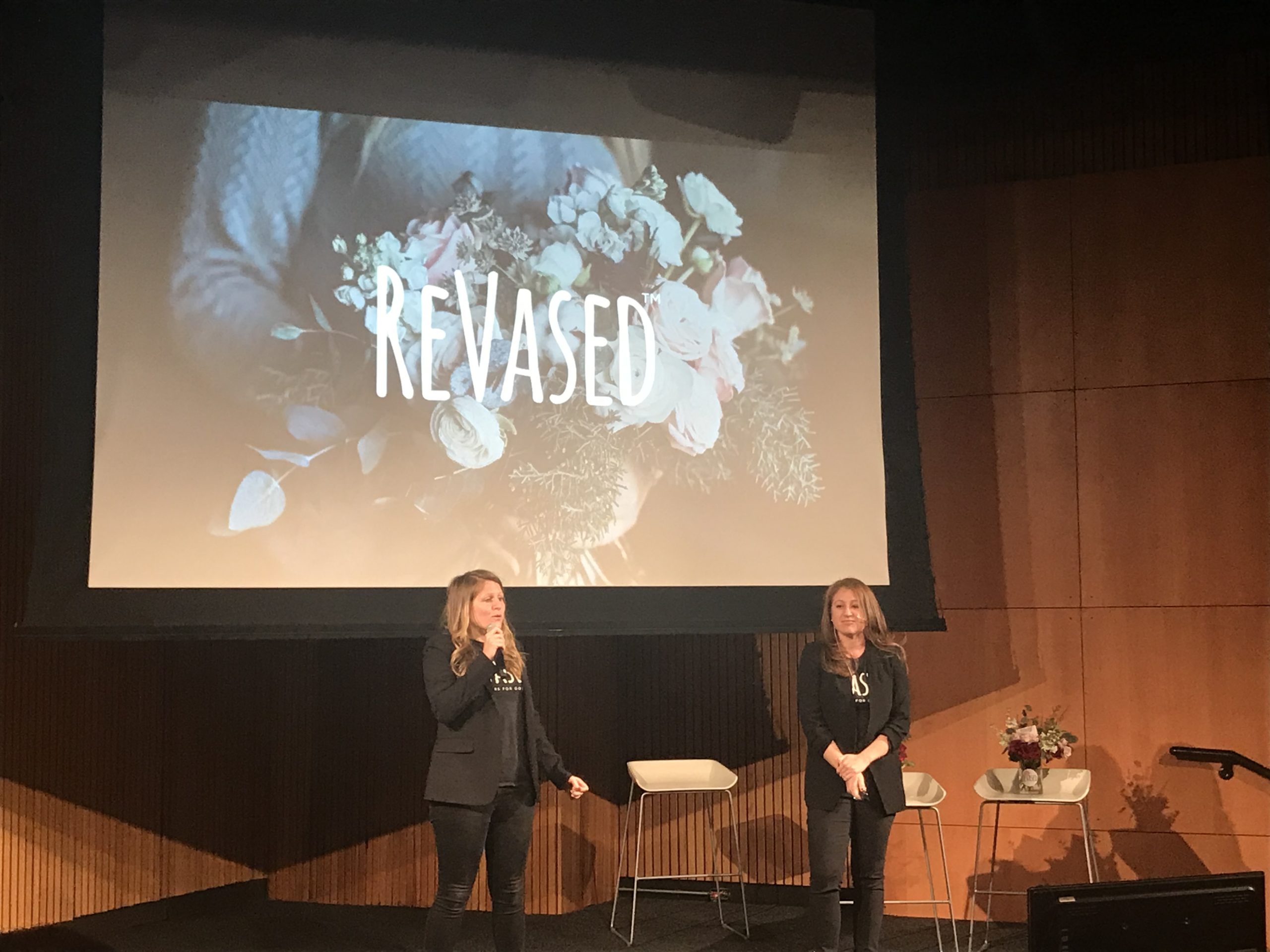
ReVased cofounders Arielle and Aviva Vogelstein. (Photo by Stephen Babcock)
Join the conversation!
Find news, events, jobs and people who share your interests on Technical.ly's open community Slack

Baltimore daily roundup: Medtech made in Baltimore; Sen. Sanders visits Morgan State; Humane Ai review debate

Baltimore daily roundup: The city's new esports lab; a conference in Wilmington; GBC reports $4B of economic activity

Baltimore daily roundup: Find your next coworking space; sea turtle legislation; Dali raided and sued


